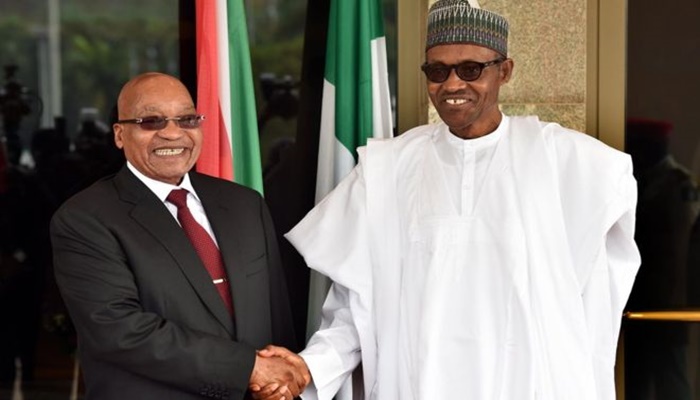
- Corroborates Dangote’s position
KPMG, a professional service company, disagrees with reports that South Africs has overtaken Nigeria as Africa’s largest economy in dollar terms, saying the calculations behind this assertion are methodologically incorrect.
The company states that the reported dollar estimates were based on Gross Domestic Product (GDP) data from the end of 2015 while the exchange rate readings are from August 2016.
According to KPMG senior economist Christie Viljoen, “The time difference between the two data points makes these calculations spurious at best and not really a reliable indicator of recent developments.”
The assumption that SA had overtaken Nigeria as Africa’s biggest economy in dollar terms emerged following the recent rand rally and the devaluation of the naira in June 2016.
In order to reflect the impact of the naira devaluation and the rand’s recovery on comparable GDP estimates, a calculation would need to be made based on GDP data for the second quarter of 2016, which are yet to be released.
The 2016 second-quarter GDP reports from SA and Nigeria would reflect stagnant economies and revisions to historical data, Viljoen says.
“From an exchange rate perspective, the naira ended the period (second quarter) notably weaker while the rand was quite stronger.”
Viljoen said he would be able to calculate the top three largest economies in Africa once second-quarter GDP data were made available by countries over the next few weeks.
Countries have always battled for the top spot particularly as this implies they are more attractive to foreign investors.
Investors mostly prioritise investing in countries with a higher economic growth potential, Investment Solutions chief economist Lesiba Mothata says. On this measure, Nigeria fares better than SA as it has the ability to grow faster than SA, he says.
The Reserve Bank has successively lowered its potential output estimates for SA from about 3.5% in 2010 to current levels of around 1.4 per cent.
Nigeria overtook SA as the continent’s biggest economy in 2014 after rebasing its GDP. SA then lost out the second position to Egypt after the rand weakened significantly in 2015.
The position of KPMG is in tandem with that of African richest man and president of Dangote Group, Alhaji Aliko Dangote who recently faulted the claim that South Africa has overtaken Nigeria as the largest economy in Africa
Speaking during the 2016 Presidential Policy Dialogue session organised by the Lagos Chamber of Commerce and Industry (LCCI) in Lagos, last week, Dangote insists that Nigeria’s place has not yet been usurped by South Africa.
It would be recalled that Bloomberg wrote on the issue last week Wednesday when it claimed that South Africa has overtaken Nigeria as the biggest economy in Africa.
This is how Business247 News online captured the story:
Barely about two years after losing it to Nigeria, South African economy has regained the position of Africa’s largest in dollar terms, as the value of the nations’ currencies moved in opposite directions.
According to Bloomberg report monitored by Business247 News Online, based on GDP at the end of 2015 published by the International Monetary Fund (IMF), the size of South African’s economy is $301 billion at the rand’s current exchange rate, while Nigeria’s GDP is $296 billion.
That is because the rand has gained more than 16 per cent against the dollar since the start of 2016, and Nigeria’s naira has lost more than a third of its value after the central bank removed a currency peg in June.
Both nations face the risk of a recession after contracting in the first quarter of the year. The Nigerian economy shrank 0.4 per cent in the three months to end-March from a year earlier, amid low oil prices and output, and a shortage of foreign currency. That curbed imports, including fuel.
In South Africa’s GDP contracted 0.2 per cent from a year earlier as farming and mining output declined.
“More than the growth outlook, in the short term the ranking of these economies is likely to be determined by exchange rate movements,” Alan Cameron, an economist at Exotix Partners, said in e-mailed responses to questions on August 2. Although Nigeria is unlikely to be unseated as Africa’s largest economy in the long run, “the momentum that took it there in the first place is now long gone”.
The rand rallied as investors turned to emerging markets with liquid capital markets to seek returns after Britain voted to leave the EU on June 23, even as the South African Reserve Bank forecast that the economy would not expand in 2016 and the nation risked losing its investment-grade credit rating.
The ANC’s lowest support since 1994 in the August 3 local government vote led to further gains, on speculation that it would pressure the party to introduce economic reform that would boost growth and cut unemployment.
In Nigeria, investors did not flock to buy naira-based assets after authorities removed the peg of 197-199 naira per dollar. The Central Bank of Nigeria raised its benchmark interest rate to a record in July to lure foreign money, even as the IMF forecast the economy would contract 1.8 per cent this year.
Nigeria was assessed as the continent’s largest economy in April 2014 when authorities in the West African nation overhauled their GDP data for the first time in two decades. The recalculation resulted in the Nigerian economy in 2013 expanding by three-quarters to an estimated 80-trillion naira.
The rand gained 1per cent to 13.2805 per dollar at 4.03pm in Johannesburg on Wednesday. The naira weakened 2.7 per cent to 320 per dollar, Bloomberg reports.







Comments are closed.